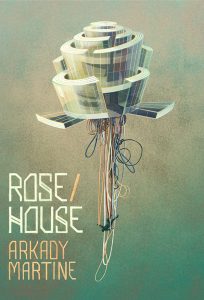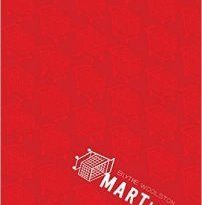Russell Letson Reviews Rose/House by Arkady Martine
 Rose/House, Arkady Martine (Subterranean 978-1-64524-033-4, $45, 125 pp, hc) March 2023. Cover by David Curtis
Rose/House, Arkady Martine (Subterranean 978-1-64524-033-4, $45, 125 pp, hc) March 2023. Cover by David Curtis
Arkady Martine’s new novella, Rose/House, is markedly different from the anthropological explorations and space operatics of her two far-future Teixcalaan Empire novels. Instead, it’s an Earthbound 22nd-century murder mystery that combines elements of the locked-room and police-procedural subvarieties, and features a science-fictionized haunted house. Detective Maritza Smith, working out of an understaffed China Lake precinct in the Mojave Desert, receives a report of a corpse in Rose House, the capstone building of famously eccentric architect Basit Deniau. Actually, there are two corpses, since Rose House also serves as Deniau’s archive and mausoleum, and the fresh body is lying at the foot of the plinth holding the architect’s remains, which have been compressed into a diamond.
The call-in report comes from the artificial intelligence that operates the House and enforces the provisions of Deniau’s will, most notably the one that keeps the building sealed up and off-limits to anyone but the estate’s executor, Selene Gisil. And since Gisil is the only person the Rose House AI will allow inside, she becomes a person of interest, if not a prime suspect. The AI’s eccentric personality and strict adherence to the will’s mandates make investigation difficult. What exactly is Maritza’s status – ‘‘person’’ or official function? How does Rose House decide which questions to answer? What might the AI’s own agenda be – assuming it has sufficient autonomy to have an agenda of its own? And then, of course, there are the standard murder-mystery questions: Who is the victim? How did he manage to enter the house? How and why was he killed? And if Rose House was a witness to the death (as it must have been), why does it not cooperate fully in Maritza’s investigation?
The best murder mysteries are not only sets of puzzles but also opportunities to examine psychological and social stress and fracture points. Accordingly, Rose/House presents three human viewpoint characters with varying degrees of internal conflict, plus the strangeness of the Rose House as a structure and a personality. Gisil is conflicted, resentful of the burden of guardianship of the legacy of the mentor whose buildings she eventually denounced as ‘‘poison palaces built for his own glorification.’’ Maritza, professional, meticulous, and reserved, has her own tensions, ‘‘the broken bit that still thought about justice when she thought about being an officer of the law, however meaningless law and officer had become.’’ Her colleague, Detective Oliver Torres, is a more workaday cop who sees dealing with killings over water rations as more important than a body in ‘‘a locked-up rich fucker’s mansion’’ – which nevertheless doesn’t prevent him from competently sizing up the parts of the case that come his way, in the form of more people seeking the secrets of Deniau’s house and its archives.
The strangest and most elusive character is Rose House itself. The physical building is an expression of its designer’s personality – a maze, a series of effects and surprises and confrontations. Maritza’s first impression is ‘‘that if she stopped… she’d be lost,’’ and Gisil explains, ‘‘It’s a shape. It’s a way of pulling you in. Of making you want to be coerced inside…. It’s the most Basit of all his houses.’’ And the house AI seems to have its own agenda, which is only partly accounted for by its functions as operating and maintenance system and enforcer of Deniau’s rules. Rose House is an enigma, at once inflexible and capricious – though Torres sees it as ‘‘a creepy fucking haunt that just barely hung on to something recognizable as programming. Obedient to no one but itself and a dead guy’s fantasy of architecture and secrecy…. a genius loci, irreversible.’’
There is a world outside the story’s immediate, constricted setting, but it is sketched in lightly and has little to do with the events. For example, most of the China Lake precinct’s serious cases have to do with water hijacking, but there is no exposition of the climate changes that would drive that crime problem. It is the enigmatic and unsettling environment of Rose House that Maritza is navigating, unsure of what the rules might be and of the reliability of her guides – which had me thinking of Mahit Dzmare in A Memory Called Empire, struggling to make sense of an alien culture. While a mystery story raises questions in order to answer them and reset order in a disordered world, Rose/House deconstructs that process and reassembles the pieces into something other – or perhaps Other – and its ending is perhaps less of a resolution than a modulation of its mysteries. The spirit that haunts this story is not that of the locked-room puzzle but something stranger and not at all reassuring.
Russell Letson, Contributing Editor, is a not-quite-retired freelance writer living in St. Cloud MN. He has been loitering around the SF world since childhood and been writing about it since his long-ago grad school days. In between, he published a good bit of business-technology and music journalism. He is still working on a book about Hawaiian slack key guitar.
This review and more like it in the April 2023 issue of Locus.
 While you are here, please take a moment to support Locus with a one-time or recurring donation. We rely on reader donations to keep the magazine and site going, and would like to keep the site paywall free, but WE NEED YOUR FINANCIAL SUPPORT to continue quality coverage of the science fiction and fantasy field.
While you are here, please take a moment to support Locus with a one-time or recurring donation. We rely on reader donations to keep the magazine and site going, and would like to keep the site paywall free, but WE NEED YOUR FINANCIAL SUPPORT to continue quality coverage of the science fiction and fantasy field.
©Locus Magazine. Copyrighted material may not be republished without permission of LSFF.







